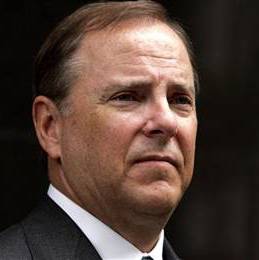 So, why is it that prosecutors won’t go after Wall Street executives for supposed criminal conduct in connection with financial crisis that began in 2008 and continues to bedevil the U.S. economy to this day?
So, why is it that prosecutors won’t go after Wall Street executives for supposed criminal conduct in connection with financial crisis that began in 2008 and continues to bedevil the U.S. economy to this day?
That’s essentially the question that this recent NPR story asks. It’s not hard to find other mainstream media pundits asking the same question.
Or course, NPR – as with most of the mainstream media — utterly fails to recognize that the government’s pursuit of criminal convictions of businesspeople over the past decade has had much more to do with chance and politics than truly criminal conduct.
Could it be that the lack of criminal prosecutions stems from federal prosecutors finally coming to the realization that merely taking business risk in an effort to create wealth and jobs really is not a crime? Indeed, the rationalization for the lack of villains now as compared to earlier crises has never been particularly compelling.
The truth is that criminal prosecutions based on merely questionable business judgment has always been fundamentally bad regulatory policy.
Few people object to criminal prosecutions of true business crimes, such as embezzlement and kickbacks.
But prosecutions based on failed business judgment obscure the true nature of business risk and fuel the myth that investment loss results primarily from criminal misconduct. Policy that deters business risk is counterproductive because such risk is what leads to valuable innovation, wealth creation and – most importantly these days – desperately needed jobs for communities.
Which brings us back to the sad case of former Enron CEO Jeff Skilling, who continues to serve a brutal 24-year sentence in a Colorado prison.
As I’ve noted many times over the years on this blog, the Fifth Circuit Court of Appeals has not distinguished itself in regard to the appeals emanating from Enron criminal cases, including Skilling’s.
First, there was the appellate court’s affirmation of a local U.S. District Court’s absurd criminal conviction of Arthur Andersen, putting a nail in the coffin of that legendary firm and over 30,000 jobs in the process.
Although too little and too late to save Andersen, that gem of a decision was subsequently overturned by a unanimous U.S. Supreme Court.
Then, in 2009, another Fifth Circuit panel affirmed a local U.S. District Court’s 2006 conviction of Skilling. Subsequently, in 2010, a unanimous U.S. Supreme Court disassembled that pearl of judicial wisdom and, in so doing, struck down the prosecution’s “creative” (and unsupported) use of honest services wire fraud to prosecute defendants over merely questionable business transactions.
But not to be outdone, on remand from the Supreme Court, the Fifth Circuit panel produced yet another clunker, this time affirming Skilling’s convictions on the conspiracy and securities fraud counts that the Supreme Court did not address in reversing Skilling’s conviction on the honest services counts. This panel decision is so bad that it contradicts two previous decisions in Enron-related criminal cases that other Fifth Circuit panels actually got right — the Kevin Howard case and the Nigerian Barge case.
In the second Skilling opinion, the Fifth Circuit panel rationalized that it was somehow “harmless error” for the prosecution to present the false honest services theory of criminal conduct regarding Skilling to the jury so long as there was sufficient evidence to support a guilty verdict on any valid alternative theory of criminality. The panel ruled that way even though the Skilling jury returned a general verdict that did not distinguish on which theory of criminality they actually relied in convicting Skilling.
Unfortunately, the Fifth Circuit panel – as pointed out eloquently by Skilling’s petition for rehearing en banc below – applied precisely the wrong standard in determining whether the remaining counts against Skilling should be reversed.
When the trial court committed the error of allowing the Skilling prosecution to obtain a conviction by pursuing its false honest services theory, the question as to the remaining counts is whether there was any evidence in the record that could rationally lead to acquittal of Skilling on those counts, not simply whether there was evidence that a jury could have relied on in convicting him. As the Skilling petition notes:
A “reviewing court making this harmless error inquiry does not . . . become in effect a second jury to determine whether the defendant is guilty.” [cite deleted] Because determining guilt or innocence is solely the province of the jury, an error requires reversal if a rational jury could have found for the defendant on the valid theory because of the contested evidentiary record. [cites deleted]
There is no question that Skilling provided substantial evidence at trial contravening all charges against him, including the conspiracy and securities fraud counts. No reasonable review of the Skilling trial record could conclude that a jury might not have found in favor of Skilling on those counts. In fact, the jury found in Skilling’s favor on nine of the original 28 counts in the first place!
In short, the Fifth Circuit panel blew the application of the standard in adjudicating the remand from the Supreme Court of the remaining counts against Skilling. If the Fifth Circuit judges are honest with themselves and the law, then they will withdraw the panel decision and remand Skilling’s case to the U.S. District Court for a new trial.
The mess that is the prosecution against Jeff Skilling is a quintessential example of what happens when government is given the leeway to bastardize charges to criminalize merely questionable business transactions and then appeal to juror resentment against a wealthy businessperson to procure a politically popular outcome.
The damage to the defendant, his career and his family that such an abuse
of power causes is bad enough. But the carnage to justice and respect for the rule of law is even more ominous.
Do any of us really believe that we could stand upright in the winds of such abusive governmental power if that gale of prosecutorial power was turned toward us?
The remaining charges against Jeff Skilling should be reversed and his case remanded to the District Court for a new trial in a fair and non-contentious environment.
Not only for his protection, but for ours.
Petition for en Banc Review and Hrg2
Like this:
Like Loading...
 Yes, our Congress is back at it:
Yes, our Congress is back at it:








 That’s essentially the question that
That’s essentially the question that